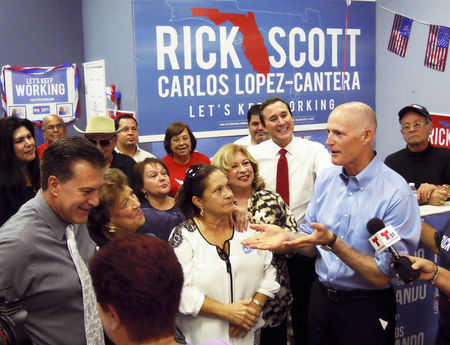By David Adams
MIAMI (Reuters) - When Florida's Republican governor, Rick Scott, walked into a bustling campaign field office late last month in Hialeah, a heavily Hispanic suburb of Miami, he was mobbed by volunteers hoping to be photographed with the candidate.
"Hey, beautiful, I got a lot of votes for you today," called out Rosa Peralta, a retired Cuban immigrant with accented English sitting by a phone bank with a plate of Cuban pastries.
Scott's campaign is making an unprecedented push for Hispanic votes in this year's gubernatorial race in the nation's largest swing state. The failure to pay enough attention to the fastest-growing segment of the state's electorate may have cost the party victory in Florida in the 2012 presidential election, Republican leaders acknowledge.
"We made a point from Day One to make a Hispanic component part of everything we do on the campaign. Not just in Miami but all across the state," said Tim Saler, Scott's deputy campaign manager.
If the Republican strategy succeeds, it will signal a major turning back of a trend, with Hispanics favoring Democrats in recent years - and will likely spell defeat for Scott's Democratic rival, former Governor Charlie Crist.
Republicans have always been able to count on older Cuban voters like Peralta, 73, who fled the Fidel Castro-led revolution in 1960. But analysts question whether they have done enough to woo non-Cuban Hispanics, including a large influx of Democrat-leaning Puerto Ricans, as well as half a million lower-income Cuban immigrants over the past decade.
"Hispanics are really coming into the Florida electorate at a very fast rate, and they are much more likely to register Democrat," said Matt Barreto, a political scientist at the University of Washington and co-founder of the polling and research firm Latino Decisions.
Since Scott squeaked out a 60,000-vote victory in 2010 over Democrat Alex Sink, the former state chief financial officer, some 714,000 voters had been added to the electorate, according to the Florida Division of Elections.
Of those, 310,000, or about 44 percent, are Hispanic, even though they make up only 17 percent of the state's 12 million voters. Whites accounted for less than 25 percent of new registrations, though they represent more than 65 percent of the voting population.
Among Hispanic registered voters, 471,000 are Republicans and 662,000 are Democrats, a wider gap - more than 11 percent - than in 2010, according to a report by the Pew Hispanic Trust.
That may explain why Scott mounted the biggest and earliest Spanish-language TV ad campaign in Florida history, starting in April. He even took some language classes and regularly breaks into halting Spanish at campaign stops.
This week his campaign began running ads in which former Governor Jeb Bush, a fluent Spanish speaker with a Mexican-born wife, urges people to vote for the Republican who produces "resultados."
Both Scott and Crist have Hispanic running mates, another Florida first, each drawing from their strengths in South Florida's Hispanic community.
Scott picked a Cuban American, Carlos Lopez-Cantera, a state legislator from Miami well known in conservative Cuban circles, while Crist chose a Colombian-Jewish businesswoman, Annette Taddeo, also from Miami.
Crist holds a 53-29 percent lead over Scott among Hispanics, according to a recent poll by Latino Decisions, suggesting Scott's campaign has made few inroads.
Democrats are counting on new Hispanic neighborhoods in central Florida such as Buenaventura Lakes, a fast-growing community of middle-class Puerto Ricans.
Miguel Fontanez, 26, owner of Pioco's Chicken Deli & Bakery, said Scott's budget cuts have hurt needy kids in Buenaventura Lakes.
"Back when Charlie Crist was running it, there was more money for kids," he said.
In this region, the Affordable Care Act, known as Obamacare, is far more popular than with white voters, and the Republican-dominated state legislature's decision to reject federally subsidized Medicaid expansion does not sit well.
Democrats say Republicans have failed to tailor their message to Hispanics, focusing on economic issues such as economic growth, job creation and more affordable college tuition.
"Our message doesn't change depending on what demographic we are talking to," said Lopez-Cantera during a morning of campaign stops in Miami visiting Medicare health centers. "I just say it in Spanish."
Democrats take the opposite tack and say the state's lower-income Hispanics have different priorities, highlighting Scott's slashing of funding for education in his first year in office.

"I speak the language, but in the end if you don't believe in certain things like public education you aren't going to appeal to the (Hispanic) community," said Taddeo.
(Addtional reporting by Barbara Liston. Editing by Douglas Royalty)
